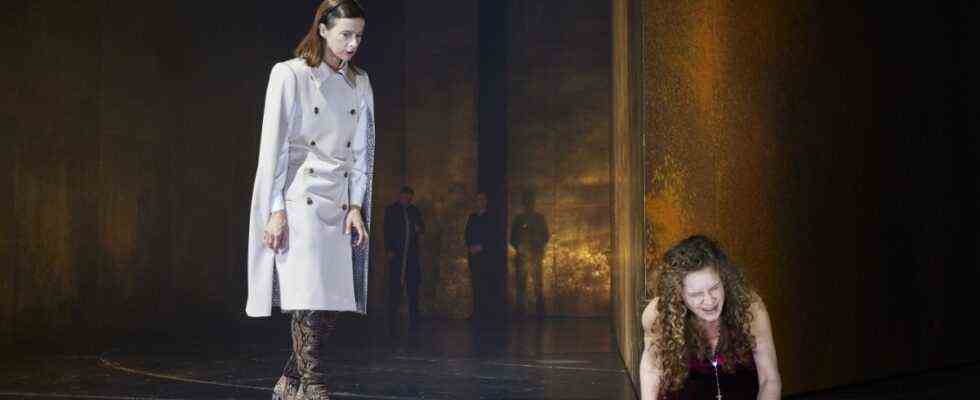Roger Vontobel comes to the conversation like a friendly theater smurf, blue suit, blue woolen hat, lightning-quick laugh. In a few hours the premiere in Bern, “Maria Stuart”, is usually where directors repair parts of the stage or actors with weak nerves. But Vontobel first takes a seat in the café. He’s excited, yes, but it’s a curious, expectant excitement. Since that season he has headed the acting division of Bühnen Bern, which is a reason to be happy.
Roger Vontobel, 44, born in Zurich, has worked as a director at all major theaters since the mid-2000s. He staged operas at the Nibelungen Festival in Worms and received a number of prizes. His works are always close to the characters and characterized by a certain impetuous serenity that, when you meet him, seems very logical. Only in Switzerland, where he has never worked. And that’s where he’s back now. He wants to advance something in leisurely, magically beautiful Bern, on the four-branch house, which is unofficially the third house in the country, after Zurich and Basel.
In addition to the artistic director Florian Scholz, he sees himself as part of a management team with the chief dramaturge Felicitas Zürcher. “It’s just that I’m the one who puts the signatures,” he says. Vontobel rejects quotas, he wants it to be “fair” and has built up his ensemble in a diverse way. He finds prejudgments horrific, no matter from which side. When hiring a controversial director, he explained why he thought it was a good idea and expected the team to be open about it. “If you still thought you didn’t want to work with him, you don’t have to either.”
The Swiss Roger Vontobel, 44, has several years of directing experience, just not yet in Switzerland.
(Photo: imago / STAR-MEDIA)
But the question that worries Vontobel most now, here, in the old and new homeland, is: How do you bring people and theater together? “About closeness,” he believes. By closeness, he doesn’t mean inviting people to cross the threshold to the theater, but rather to drive out to them. For the new “Schauspiel mobil”, the theater packs a few stage elements, a few technicians and actors into a Sprinter and moves them to the country, to village squares and community halls. “The talented Mr. Ripley” is how they perform, soon “The Dragon” by Evgeni Schwarz, in Swiss German. Vontobel says that he no longer feels like having “big equipment options”. “That a person says and thinks a text on stage works. Reduction to the essentials.”
It can therefore be guessed that Vontobel would rather not flaunt glaring aesthetics with his “Maria Stuart”, performed in the big house, like recently Martin Kušej in Salzburgwho surrounded the queens with a horde of naked men. Then he doesn’t either. His “Maria Stuart” is reduced, concentrated and conservatively staged, if conservative means having trust in the established. In the middle of the empty stage, a body rotates in the shape of a gigantic, wedge-shaped blade. There are three huge walls that the actors can press against, behind which they listen lurking to what is being said on the other side.
Just because one queen is trapped doesn’t mean the other is free
One side is painted gold, the other rust-colored, Queen Elizabeth I here, the imprisoned Maria Stuart there. But just because one is trapped doesn’t mean the other is free. Vontobel gives Elisabeth a lot of time to complain about the people’s unreasonable demands for children; he is interested in the dilemma of working women. Isabelle Menke plays a girl who is tired of ruling in a pope-like outfit (costumes: Ellen Hofmann), who has worked off every spark of warmth. As Maria Stuart, Yohanna Schwertfeger is a tomboy in a red velvet dress, with loose hair and a crucifix tattoo, which is a bit over-illustrated. She plays Schwertfeger impulsively and lasciviously, which is sometimes too much. Maria Stuart, who seems freer in spirit than her opponent, is nonetheless dependent, also on the encouragement of the men, who are rather weak types here, looking for their own advantage. In any case, this Maria is not more likeable than Elisabeth, which in turn is a directorial effort, after all, the audience would like to make themselves comfortable and literally want to slap on one side of the wall.
Vontobel tells a fast-paced psychological political thriller, a story of information and betrayal. Here the characters often know more than the Schillertext suggests, they have the power of information that they can use for themselves. What was now in Maria Stuart’s letters, which of them is forged, which is not, who knew about it? Schiller’s blank verses come surprisingly easily from the actors’ lips, Keith O’Brien has created a soundtrack that is in no way inferior to a Netflix intro. Vontobel calmly leads the two queens towards each other and Maria Stuart finally leads them to the point of their execution. He’s right, man and text, that’s all it takes. This is also how closeness works.

